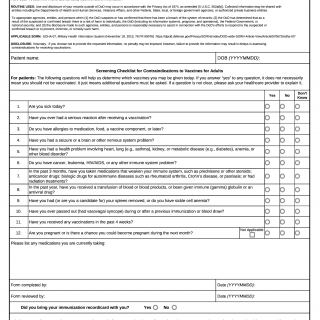DD Form 3111. Routine Immunization Screening Form: Adult
DD Form 3111 is a Routine Immunization Screening Form for adults. It is used by healthcare professionals to assess whether an individual can safely receive a routine immunization. The form contains questions about the individual's medical history and health status to determine any contraindications or precautions related to vaccinations.
The primary purpose of DD Form 3111 is to ensure the safety and efficacy of routine immunizations for adults. By completing this form, healthcare providers can identify any potential risks or contraindications to vaccination and make informed decisions about the administration of vaccines.
Key Information and Cases:
-
Are you sick today?
- The form starts by asking if the individual is currently ill. While most mild illnesses are not contraindications to vaccination, moderate or severe acute illnesses may warrant delaying vaccination until the individual's health improves.
-
Have you ever had a serious reaction after receiving a vaccination?
- This question addresses any history of serious allergic reactions or adverse events following previous vaccinations. Such a history may be a contraindication for future doses of the same vaccine.
-
Do you have allergies to medications, food, a vaccine component, or latex?
- Individuals with known allergies to vaccine components or latex may have contraindications to specific vaccines. Anaphylactic reactions to latex or gelatin can impact vaccination decisions.
-
Have you had a seizure or a brain or other nervous system problem?
- Certain neurological conditions may warrant precautions or contraindications to specific vaccines. A history of encephalopathy following a pertussis-containing vaccine, for instance, may contraindicate further doses.
-
Have you had a health problem involving heart, lung, kidney, or metabolic disease, anemia, or other blood disorder?
- Preexisting health conditions, such as heart or lung issues, can affect vaccination decisions. Specific vaccines may be contraindicated or require precautions based on the individual's health history.
-
Do you have cancer, leukemia, HIV/AIDS, or any other immune system problem?
- Individuals with compromised immune systems may need special considerations when it comes to vaccines. Live virus vaccines are generally contraindicated, but exceptions may apply based on individual circumstances.
-
In the past 3 months, have you taken medications that weaken your immune system?
- Medications that suppress the immune system can impact vaccine effectiveness and safety. Decisions about vaccination may need to be delayed or made with caution.
-
In the past year, have you received a transfusion of blood or blood products, or been given immune globulin or an antiviral drug?
- The timing of certain vaccines may need to be adjusted based on recent blood transfusions, immune globulin administration, or antiviral drug use.
-
Have you had (or are you a candidate for) your spleen removed, or do you have sickle cell anemia?
- Individuals without a spleen or with certain blood disorders may be at higher risk for specific infections. Vaccination recommendations may vary based on these conditions.
-
Have you ever passed out (had vasovagal syncope) during or after a previous immunization or blood draw?
- Individuals prone to fainting during medical procedures should take precautions during vaccination to prevent injuries.
-
Have you received any vaccinations in the past 4 weeks?
- The timing of vaccines can be important to ensure their effectiveness. Some vaccines may need to be administered separately if given within a certain timeframe.
-
Are you pregnant, or is there a chance you could become pregnant during the next month?
- Pregnancy can affect the timing and types of vaccines that are safe to administer. Certain live vaccines are contraindicated during pregnancy.
DD Form 3111 is a crucial tool for healthcare professionals to assess an individual's eligibility for routine immunizations. It helps ensure that vaccinations are administered safely and effectively, taking into account the individual's medical history and specific health conditions. By carefully considering the responses to these questions, healthcare providers can make informed decisions about the timing and types of vaccines suitable for each individual.

